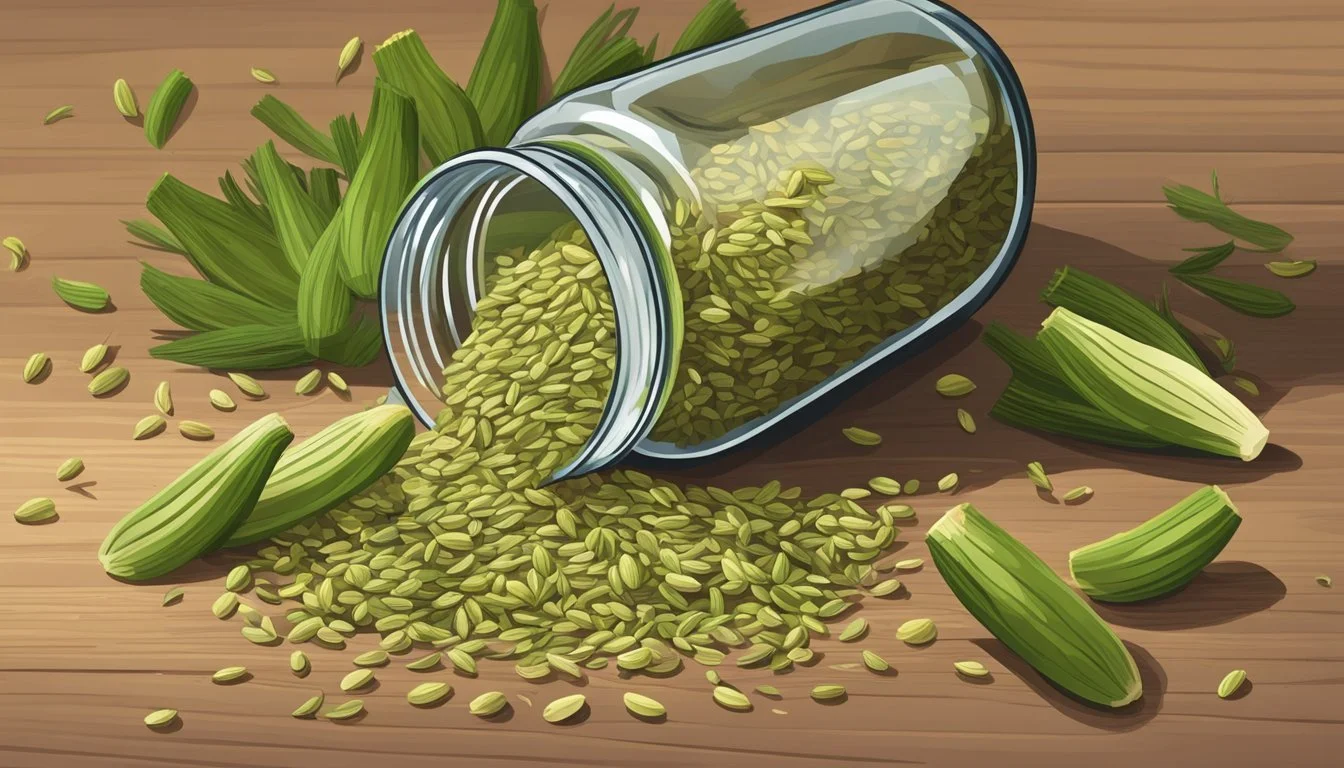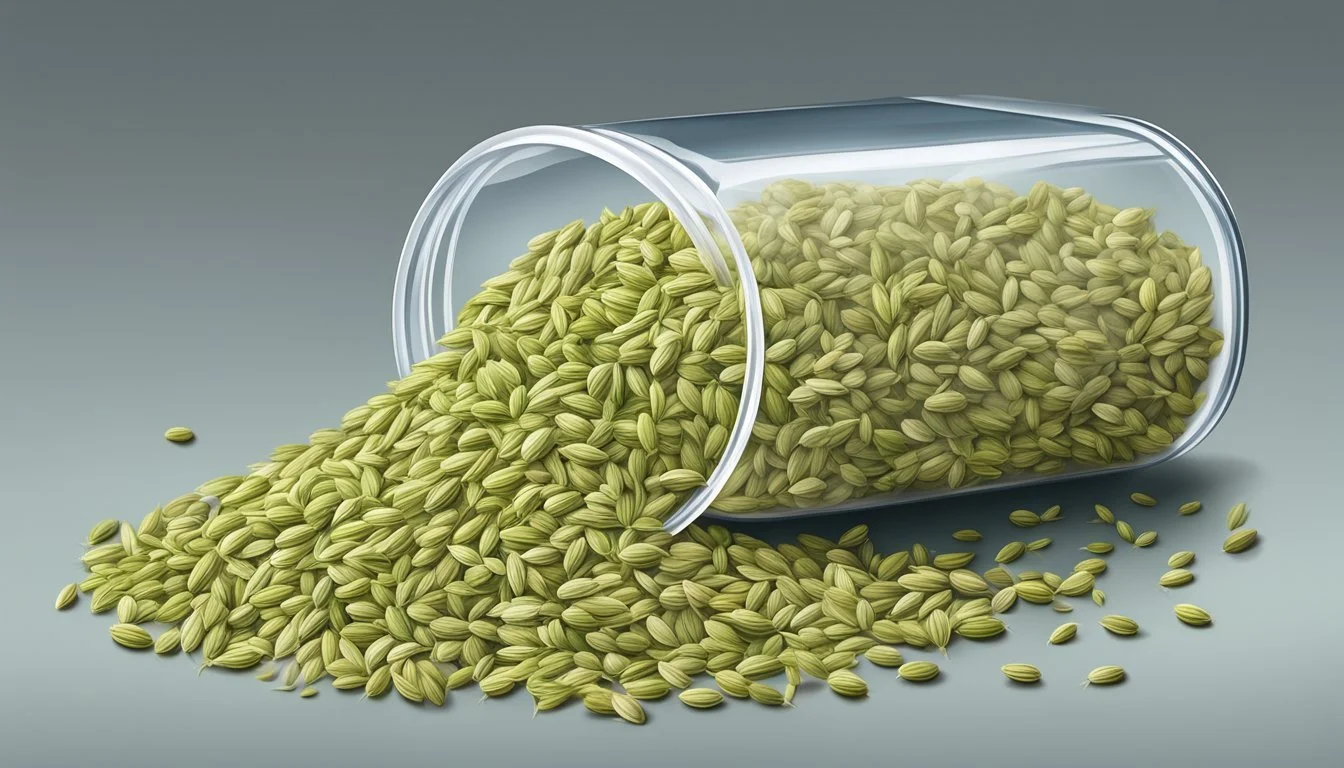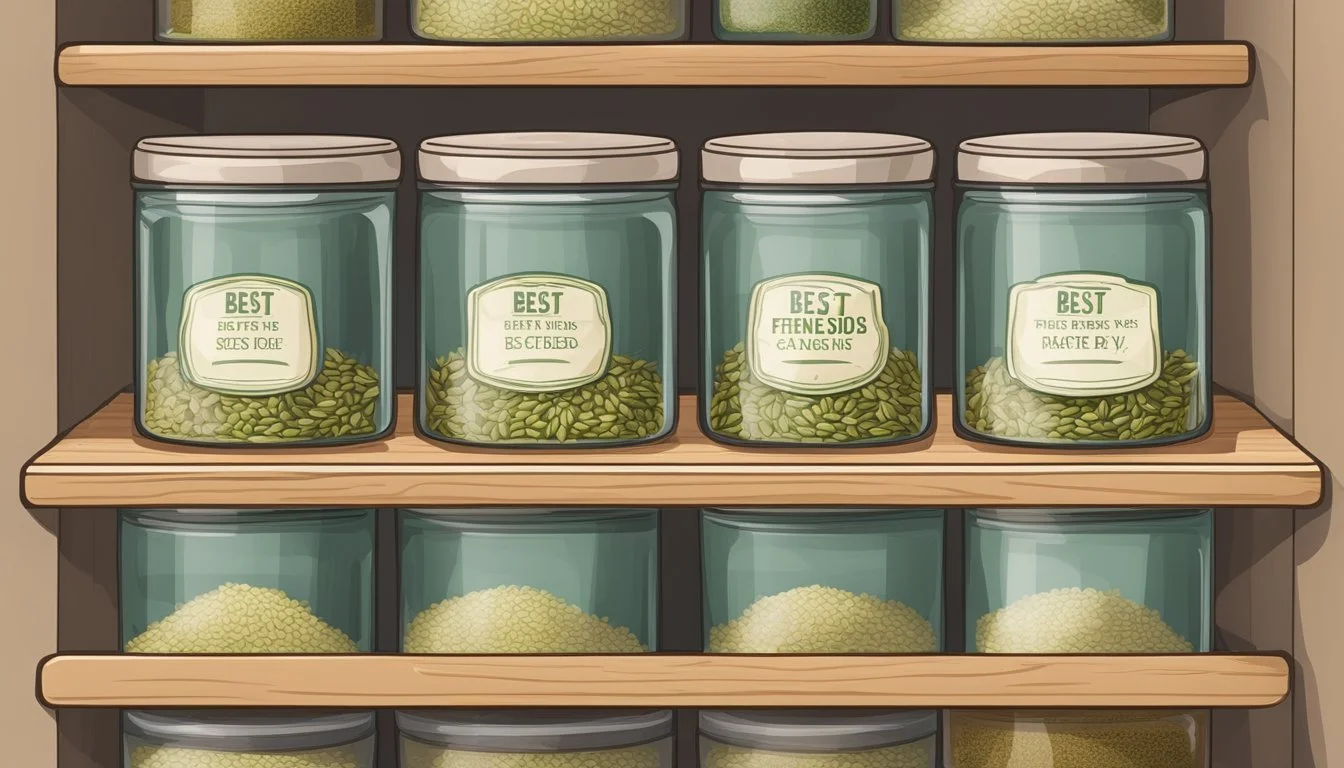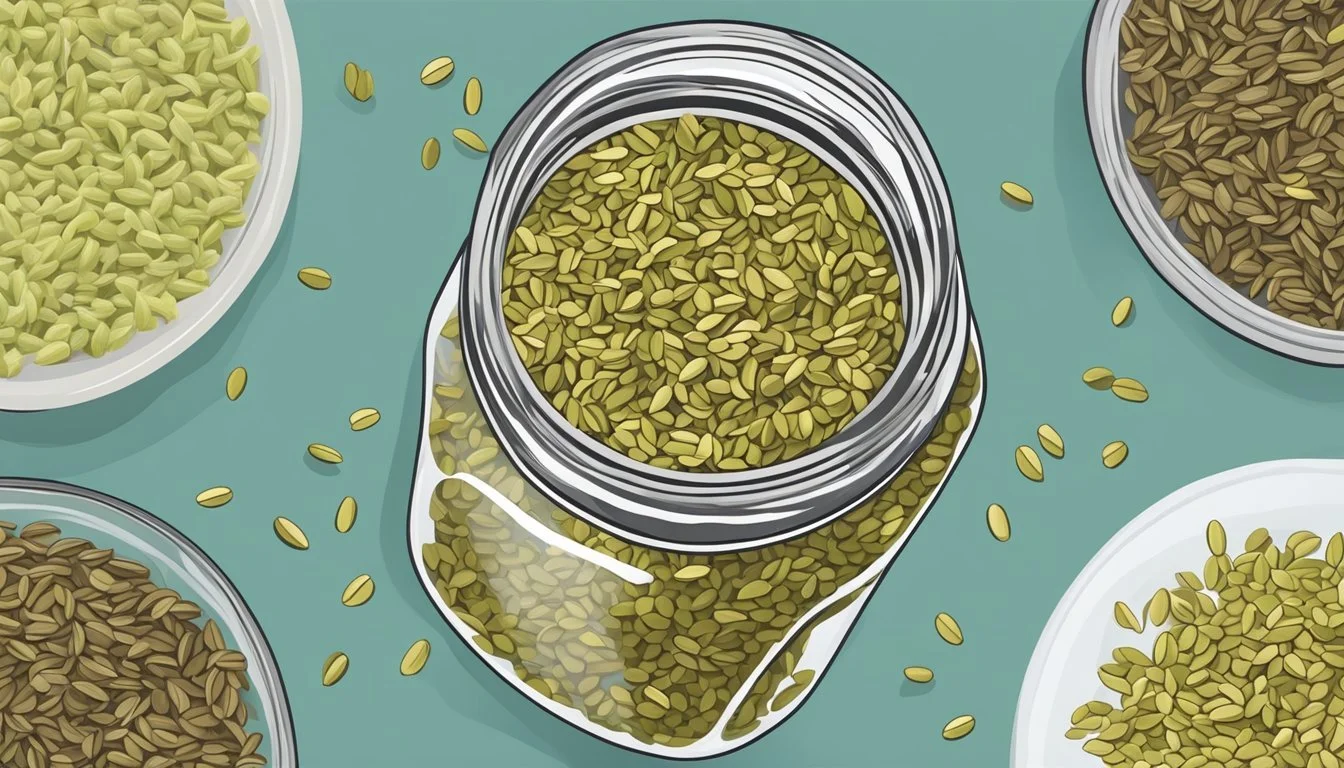Do Fennel Seeds Go Bad?
Signs and Shelf Life Explained
Fennel seeds, known for their distinct licorice-like flavor and aroma, are a staple in many kitchens. When considering the question, fennel seeds do not truly expire but their quality and potency degrade over time. Proper storage is key to maintaining their freshness and extending their shelf life.
Typically, fennel seeds can last up to four years if stored in a cool, dry place. Over time, even with ideal storage conditions, the aroma and flavor will gradually diminish, which affects the overall experience when using them in recipes.
To prevent early spoilage, it is essential to keep fennel seeds in an environment with temperatures around or lower than 42°F (5.6°C) and low humidity. This ensures that the seeds remain flavorful and potent for as long as possible, making them a reliable component in various dishes.
Understanding Fennel Seeds
Fennel seeds are a versatile spice known for their distinct licorice-like flavor and are widely used in Mediterranean cuisine. They also offer various health benefits due to their rich nutritional profile.
Origin and Culinary Uses
Fennel seeds originate from the fennel plant (Foeniculum vulgare), which is native to the Mediterranean region. The seeds have a sweet, anise-like flavor that can enhance a variety of dishes. They are commonly used in both sweet and savory recipes.
Fennel seeds are integral in spice blends like Indian garam masala and Chinese five-spice powder. In cooking, they can be used whole or ground to flavor bread, cookies, stews, and sausages. Toasting the seeds can bring out their aromatic qualities, making them more fragrant in recipes. Furthermore, fennel seeds can be used as a breath freshener and digestive aid post-meals.
Nutritional Profile
Fennel seeds are a nutrient-rich spice that provides various health benefits. They are high in fiber, which aids in digestion and helps maintain a healthy weight. Fennel seeds contain significant levels of vitamin C, iron, calcium, potassium, and manganese.
Iron in fennel seeds supports blood production, while calcium and vitamin C contribute to bone health and immune function. Potassium is vital for regulating blood pressure, and manganese helps in energy metabolism. The anti-inflammatory properties of the seeds also help reduce inflammation and bolster overall health. The seeds are known to aid digestion and support weight loss due to their rich fiber content.
Factors Affecting Freshness and Potency
Fennel seeds, like many spices, can maintain their quality for extended periods if stored correctly. Several factors contribute significantly to the longevity and potency of fennel seeds.
Light and Heat Exposure
Exposure to light and heat can greatly affect the freshness and potency of fennel seeds. Fennel seeds contain essential oils, such as anethole, responsible for their distinctive licorice-like flavor and aroma.
When exposed to light and heat, these essential oils can deteriorate over time. This degradation reduces the seeds' intensity and overall quality. Therefore, storing fennel seeds in opaque, dark containers and keeping them in cool environments, ideally below 42°F (5.6°C), can help preserve their potency.
It is also advisable to keep the storage containers away from direct sunlight and heat sources such as ovens and stoves.
Moisture and Humidity
Moisture and humidity are detrimental to the longevity of fennel seeds. When exposed to high humidity levels, fennel seeds can absorb moisture, leading to mold growth and spoilage.
To maintain freshness, it is crucial to store them in an environment with low humidity. An airtight container can help keep the seeds dry and protect them from ambient moisture.
Additionally, consider using desiccants in storage containers for added protection. Refrigeration can be beneficial, but freezer storage extends the freshness even further by keeping moisture levels consistently low.
Air Exposure
Air exposure can lead to the oxidation of essential oils in fennel seeds, diminishing their aroma and flavor. It also increases the risk of the seeds absorbing odors from the surrounding environment, which can affect their taste.
To combat this, it is essential to use airtight containers that minimize air contact. Glass jars with sealed lids or vacuum-sealed bags can be particularly effective.
Frequent opening and closing of these containers should be avoided, as this can introduce fresh air and speed up the degradation process. Keeping the seeds in small, portioned containers can reduce air exposure during use.
Optimal Storage Conditions
Fennel seeds can maintain their quality for years if stored properly. Ensuring the right environment and packaging are crucial for preserving their flavor, aroma, and viability.
Cool and Dry Locations
A cool and dry environment significantly extends the lifespan of fennel seeds. The optimal temperature for storage is below 42°F (5.6°C). Humidity levels should be kept low to prevent the seeds from spoiling.
It is advisable to store fennel seeds in a pantry or a cupboard away from direct sunlight and heat sources. These conditions help to maintain the seeds' texture and taste. Avoid places that experience fluctuating temperatures or high humidity, such as near a stove or dishwasher.
Refrigeration and Freezing
For long-term storage, refrigeration or freezing is highly effective. Keeping fennel seeds in the fridge at temperatures between 32-41°F (0-5°C) can preserve their freshness for longer periods.
Freezing is another excellent option. Place the seeds in an airtight container or a plastic bag before freezing to prevent moisture from affecting them. This method is particularly beneficial for retaining the seeds' flavor and aroma over several years.
Packaging and Containers
Proper packaging is essential to protect fennel seeds from air and moisture. Use airtight containers like glass jars with tight-fitting lids, or high-quality plastic containers.
If using plastic bags, ensure they are sealed well and consider double-bagging for added protection. For an extra layer of security, wrap the seeds in a paper towel before placing them in the bag or container. This additional step can absorb any minimal moisture, safeguarding the seeds' quality.
Labels with the packaging date can aid in tracking storage times, ensuring seeds are used when they are at their best.
Identifying Spoilage
To determine if fennel seeds have gone bad, check for changes in appearance and alterations in smell and taste. These signs help ensure the seeds' culinary effectiveness and safety.
Changes in Appearance
Inspect fennel seeds for mold, discoloration, or textural changes. Mold growth can appear as white or greenish spots, indicating spoilage.
Discoloration might manifest as unusually dark or unevenly colored seeds. Fresh fennel seeds typically have a consistent greenish-brown hue.
Similarly, a change in texture, such as seeds becoming too soft or too hard, suggests deterioration. Seeds should be firm; any deviation could mean they are no longer viable.
Altered Smell and Taste
Fennel seeds have a distinctive licorice-like scent. If the smell becomes rancid, stale, or off-putting, it indicates spoilage.
Fresh seeds should have a strong aroma. A loss of this characteristic smell means the seeds are likely past their prime.
Taste is another indicator. Fresh fennel seeds should have a potent flavor. If the taste is weak or off, it's a sign they've deteriorated.
Testing for smell and taste can be done by gently crushing a few seeds and sniffing or tasting them. This method effectively identifies if they have gone bad.
Shelf Life and Expiration
Fennel seeds, if stored properly, can have a notably long shelf life. However, their quality and viability decline over time, necessitating proper storage to maximize their longevity.
Expected Shelf Life Metrics
Whole fennel seeds typically last between 3 to 4 years when stored in optimal conditions. These conditions include keeping the seeds dry, cool, and away from light. Properly stored fennel seeds maintain their flavor and potency for an extended period.
Ground fennel seeds, having a greater surface area, tend to have a shorter shelf life. They usually remain viable for about one year. The increased exposure to air accelerates the loss of essential oils, reducing the shelf life.
Expiration Dates and Practices
Fennel seeds do not have a set expiration date but rather a period during which they are most potent. The degradation of quality is gradual and may not be immediately noticeable. It's advisable to monitor their aroma and taste to judge their status.
Proper storage includes keeping seeds in airtight containers and placing them in a cool, dark place. For extended storage, refrigeration or freezing can be effective. Ensure the seeds are completely dry before storing them in cold environments to prevent moisture-related spoilage.
The key practices to prevent loss of potency include maintaining low temperatures and minimizing exposure to light and air. These simple steps can significantly prolong the usability of fennel seeds.
Extending Fennel Seeds' Lifespan
Proper storage can significantly extend the shelf life of fennel seeds while retaining their flavor and potency. It is crucial to manage factors such as moisture, temperature, and air exposure to achieve this.
Best Practices for Longevity
Storing fennel seeds in an airtight container helps prevent exposure to air, which can degrade essential oils.
Humidity and temperature are also critical; for best results, keep fennel seeds in a cool, dry environment away from direct sunlight. The ideal storage temperature is around 42°F (5.6°C).
If possible, use dark-colored glass jars or opaque containers to further protect seeds from light.
Refresh Techniques
When fennel seeds start losing potency, simple kitchen techniques can help refresh them.
Lightly toasting the seeds in a pan for a few minutes can revive their aroma and flavor.
Alternatively, grinding fresh seeds as needed exposes the essential oils locked inside, rejuvenating their taste.
Both methods can enhance the aroma and usefulness of older fennel seeds, making them more effective in recipes.
Culinary Applications
Fennel seeds enhance various dishes with their distinctive anise-like flavor and are integral to several cuisines. They can be used in multiple forms, from whole seeds to ground powder, providing versatility in the kitchen.
Using Fennel Seeds in Recipes
Fennel seeds can be toasted to elevate their aroma and flavor. Heating them in a dry skillet for 1-2 minutes until they turn golden-brown is recommended. Toasted seeds can be used whole or ground. These seeds are a key ingredient in spice blends like garam masala and Chinese five-spice.
Fennel seeds are often added to soups, stews, and sauces for depth. In Mediterranean cuisine, they are popular in dishes like tomato and fennel pickles and fennel-scented bread. They also feature in Italian sausages, providing a rich and aromatic flavor.
Pairings and Combinations
Fennel seeds pair well with various herbs and spices, including coriander, sage, and dill. Their licorice-like taste complements meats such as pork, poultry, and fish. They are often used in seasoning blends for roasted meats and grilled vegetables.
In desserts, fennel seeds can be combined with citrus and vanilla for a unique flavor profile. They also infuse oils and vinegars, creating flavorful bases for salad dressings or marinades. The seeds are also a popular ingredient in certain teas, adding a soothing, aromatic character.
Other Key Pairings:
Fish: Enhances delicate flavors with a subtle sweetness.
Pork: Adds herbal notes that balance rich meats.
Breads: Provides an aromatic twist to baked goods.
These pairings showcase the versatility and flavor-enhancing properties of fennel seeds in diverse culinary applications.








